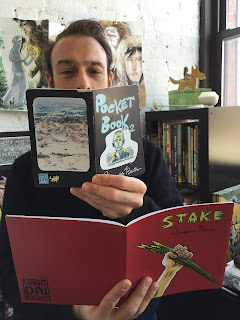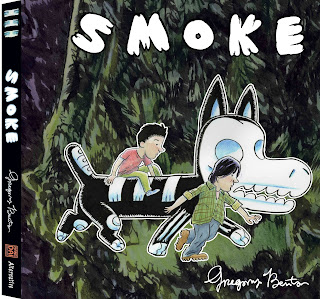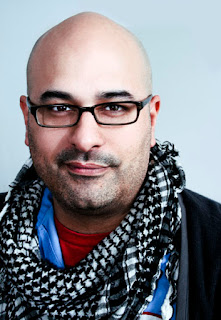 by Mike Rhode
by Mike RhodeBaltimore Comic-Con is one of the best and friendliest of the mid-size superhero focused cons. Under the leadership of Marc Nathan and Brad Tree, it's grown quite a bit in a decade and a half, but still remains enjoyable for all ages and interests. Hang Dai Studios is based in Brooklyn, but as usual will have a big presence at Baltimore. My friend Dean Haspiel (and Hang Dai Studios founder) will be there with the whole studio, a week after he, Christa Cassano and Gregory Benton attended the Small Press Expo. Just when you think there's nobody left in the Studio to talk with, our sixth interview is with writer and actor Chris Miskiewicz.
What type of comic work or cartooning do you do?
I’m a Brooklyn-based writer and actor. In comics, I’m best known for writing the critically acclaimed series, Thomas Alsop alongside artist Palle Schmidt (dubbed Best Mini-Series of 2014 by USA Today) published by BOOM! Studios. And the comic anthology Everywhere published by ActivateComix. As an actor I’ve appeared on HBO's Bored to Death, USA Networks White Collar, and various others.
When (within a decade is fine) and where were you born?
I’m a native New Yorker. I’m 4th generation Italian and 1st generation Polish, born in Brooklyn, NY.
What is your training and/or education in cartooning?
I took up writing and drama in college, but I’ve been a comic book reader since I was ten years old. It was the first type of fiction I got, and I never fell out of love with the episodic nature of the industry.
Who are your influences?
Warren Ellis, Mark Millar, Ed Brubaker, Mike Mignola, Frank Miller, Brian K. Vaughn, Charles Bukowski.

What work are you best-known for?
Currently Thomas Alsop published by BOOM! Studios.
What work are you most proud of?

Thomas Alsop and a webseries I co-wrote with my cousin Christopher Piazza called The Adventures of Shakespeare & Watson: Detectives of Mystery. It’s absolutely bonkers and I wish Adult Swim would call me up right now to buy it.
What would you like to do or work on in the future?
I write in all forms. Prose, comics, screenwriting, as well as physical storytelling in acting, and a bunch of short films. I’d like to continue exploring every way you can tell a tale. I mean, if Shakespeare were alive he’d probably have a blog…
What do you do when you're in a rut or have writer's block?

Drugs, drinking, go up to the roof and crawl into a bawl crying that all of my life choices have been wrong and that I’m a failure, play “Simpson’s Tapped Out,” breaking and entering somewhere I shouldn’t be to snap a picture.
You know, the normal things a person with voices in their head does during a crisis.
What do you think will be the future of your field?
I think comics will continue to be a testing ground for properties that larger media are considering for live action works.
Why are you at the Baltimore Comic-Con this year?
I’m hanging with some old friends at Hang-Dai’s table, as well as appearing on a panel with them on Sunday 1:30 pm – 2:30 pm in room 343-344 which is followed by a quick signing at BOOM!’s booth #2001 from 3 to 4 pm.
 What other cons do you attend? The Small Press Expo, or others? Any comments about attending them?
What other cons do you attend? The Small Press Expo, or others? Any comments about attending them? This year I’ve been to MOCCA, SDCC and Copenhagen Comic Con for the release of the Danish translated edition of Thomas Alsop vol. 1. Copenhagen Comic Con was awesome, and I want someone to adopt me so I can move to Denmark.
I’ll also be appearing at NYCC in October…
What's your favorite thing about Baltimore?
The Wire.
How about a favorite local restaurant?
Hit me up again after this convention.
Do you have a website or blog?
My site is being completed, but you can follow me on twitter at @CMMiskiewicz and track me down at: http://welcometotripcity.com/






















